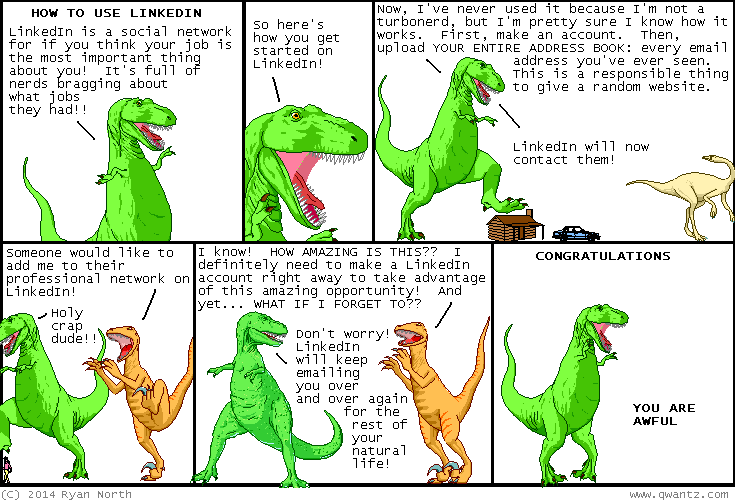A funny reminder of what normals think about many of us
I am pretty sure my favorite, offbeat website is Dinosaur Comics. I know I have blogged at least a couple of times over the years with a take on something interesting that the genius behind Dinosaur Comics, Ryan North has posted. And his idea, a comic series where the pictures, panels, and layouts are exactly the same every day, but with the topics and dialog between the two characters changing, is really unique and remarkable.
Recently, Dinosaur Comics took on the topic of HR and Recruiting's favorite sourcing and people research tool, LinkedIn. Take a look at what two comic dinosaurs think about LinkedIn, and then I (natch) will have a couple of comments after the comic.

Really funny, right? But to paraphrase the great Joe Pesci in Goodfellas - how is it funny? And should we really care beyond laughing? A couple of quick thoughts:
1. 'Normals', i.e. people who don't live and die all day long on LinkedIn, are not all that concerned with their 'personal brand', and don't actually feel like their job is the most important thing about them likely make up the majority of your workforce.
2. Most of these people, I think, are not at all comfortable with the notion that the divide or the separation between 'work' and 'not working' is diminishing (or even disappearing). Lots and lots of solid and even outstanding performers are not thinking about work after 5PM. And they are not spending their weekends sending LinkedIn connection requests. They are, once again, 'normal.'
3. HR and Recruiting people love to tell everyone who will listen that 'They need to be on LinkedIn' and offer endless tips and tricks so that people can 'Get the most out of their LinkedIn profile'. They do this for primarily self-serving reasons - they want the full range of people that they someday might be interested in contacting about job opportunities to be easily findable and contactable, (facilitated by tossing a few $$ to LinkedIn). I wish some honest recruiter would just post an article that says 'If you ever want to be considered for a job at my company, here is what I expect to see on your LinkedIn profile.' But instead we get dozens and dozens of pieces about 'optimization' tips. So boring.
I don't mean to take shots at LinkedIn, I am a long-time user and have gotten some value out of that over the years. But I also think it has become too easy (and lazy) to have one and only one source for universal professional information. And one that normal people don't really understand as well.

 Steve
Steve

